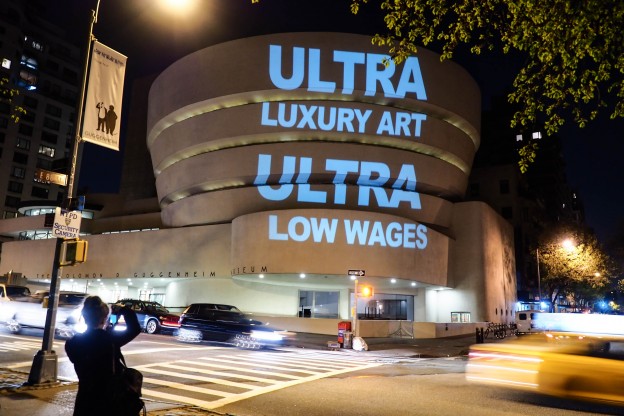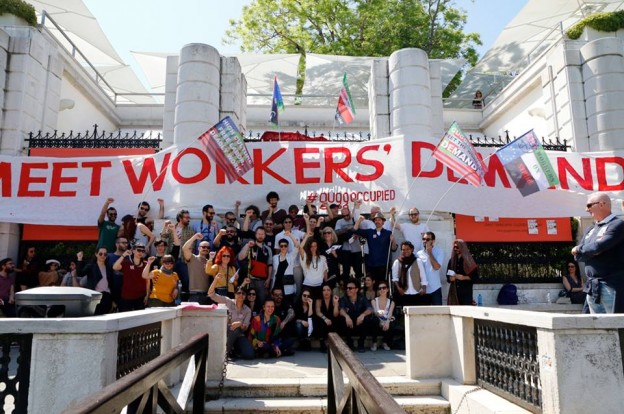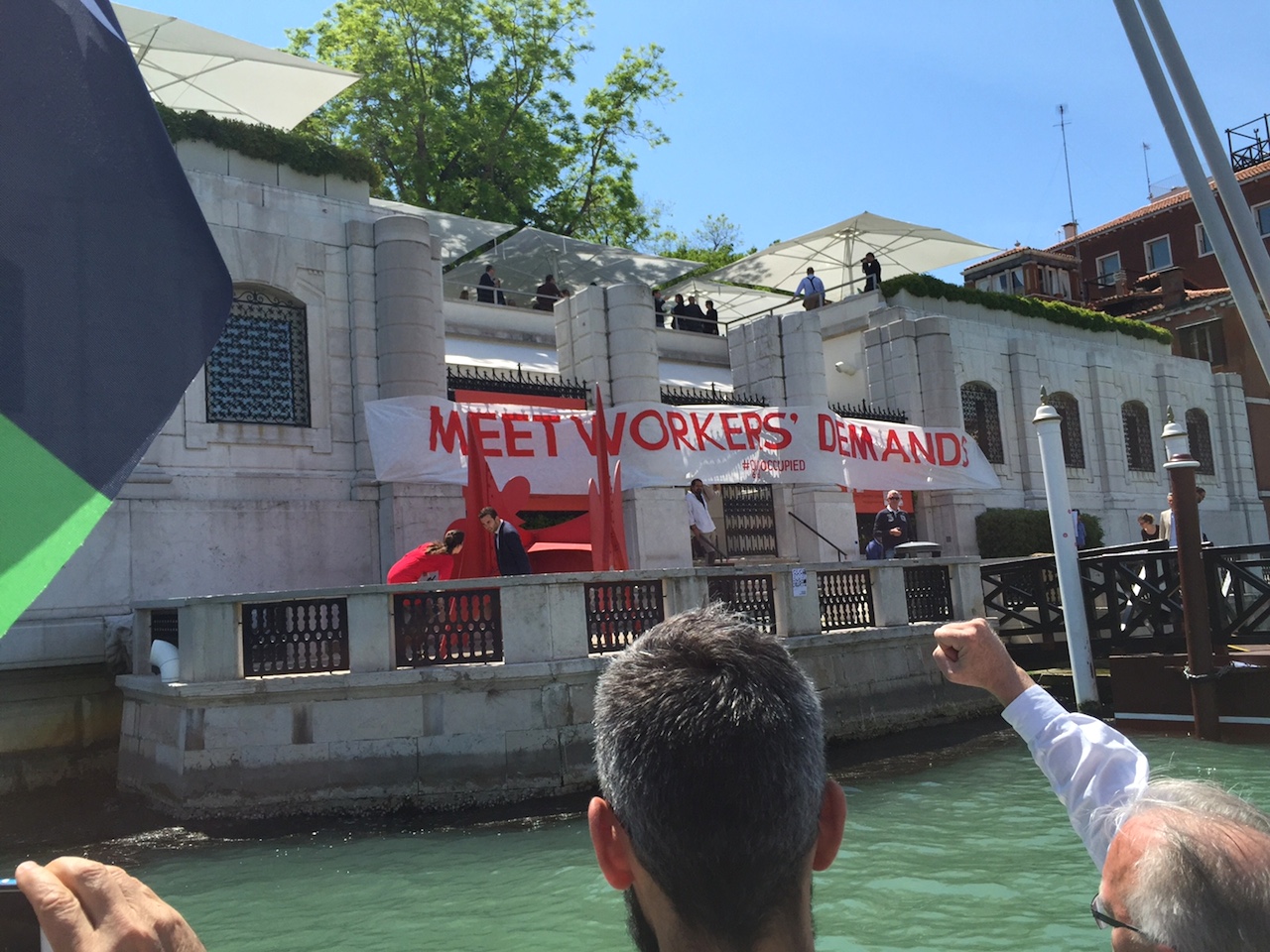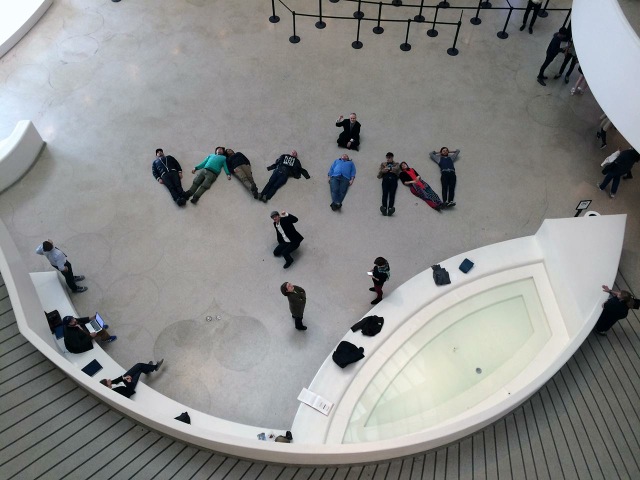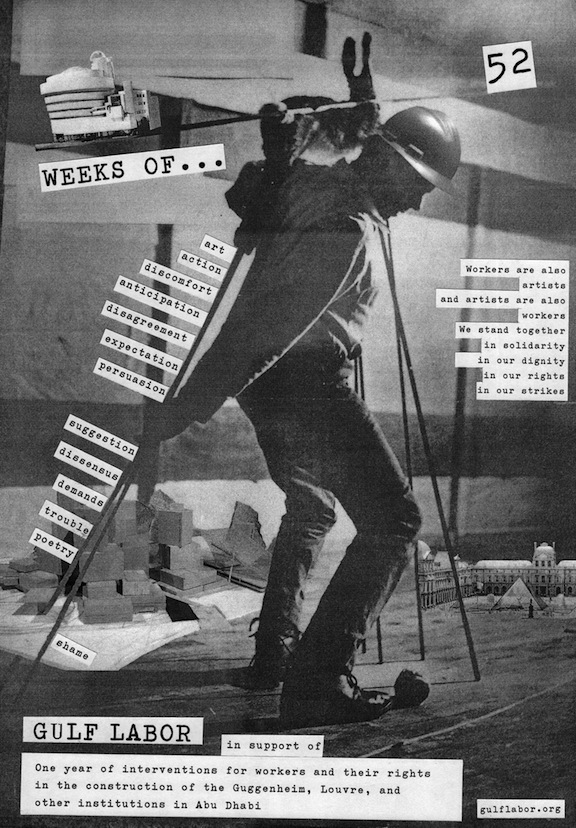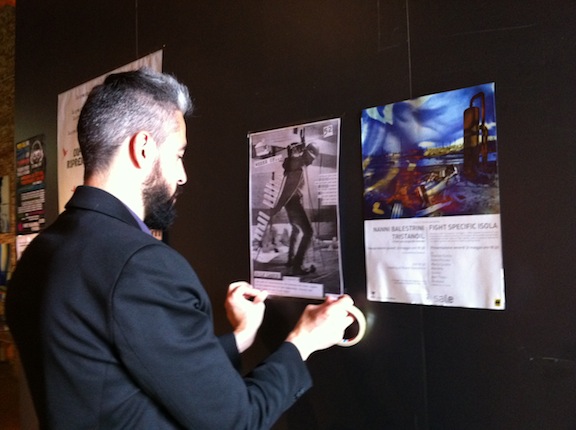FOR IMMEDIATE RELEASE:
GULF LABOR LAUNCHES 52 WEEKS OF GULF LABOR
New York, October 17, 2013
What is 52 Weeks?
“52 Weeks” is a one year campaign starting in October 2013. Artists, writers, and activists from different cities and countries are invited to contribute a work, a text, or action each week that relates to or highlights the coercive recruitment, and deplorable living and working conditions of migrant laborers in Abu Dhabi who are building the Guggenheim, the Louvre, and the Sheikh Zayed National Museum (in collaboration with the British Museum).
Contributions during the first 13 weeks by: Doug Ashford, Doris Bittar, Sam Durant, Matthew Greco, Gulf Labor, Hans Haacke, Thomas Hirschhorn, Lynn Love, Guy Mannes-Abbott, Naeem Mohaiemen, Walid Raad, Oliver Ressler, Andrew Ross, Jayce Salloum, Ann Sappenfield, Gregory Sholette.
Additional contributions in the coming 52 weeks by: Haig Aivazian, Shaina Anand, Ayreen Anastas, Yto Berrada, Noel Doublas, Rana Jaleel, Rene Gabri, Mariam Ghani, Maryam Monalisa Gharavi, Josh MacPhee, Marina Naprushkina, Shirin Neshat, Ashok Sukumaran, WBYA (Who Builds Your Architecture), and many others.
Walid Raad, a member of Gulf Labor stated: “If the Guggenheim, Louvre and TDIC [Tourism, Development & Investment Company. Abu Dhabi] were willing to invest as much energy and resources into safeguarding the rights of workers buildings museums on Saadiyat Island, as they are on hiring “starchitects,” building engineering marvels, and buying challenging artworks, then their claims of building the best infrastructure for the arts in the world would be more than words in the wind. Abu Dhabi, its residents and workers, deserve more than the “edgy” buildings and collections proposed by the best museum-brands in the world. Abu Dhabi also deserves the development, implementation and enforcement of the most progressive labor laws for their emerging institutions. If the museums can’t see this, then I can only hope that the ruling Sheikhs and Sheikhas will, and soon.”
Doris Bittar, a member of Gulf Labor stated: “Appearances are deceiving. The workers building the museums in Abu Dhabi look neat in their blue uniforms and hard hats. Their cared for appearance belie the facts that many are working 15-hour shifts, have had their passports confiscated and cannot leave or quit, they cannot congregate or collectively make demands regarding their lack of pay and their poor living conditions, and they have no recourse if they are physically abused because of unenforced labor laws. Sometimes, the only way they can leave and be sent home is in caskets.”
Guy Mannes-Abbott, a member of Gulf Labor stated: “Abu Dhabi is building urban infrastructure, cultural institutions and tourist facilities to developed-world standards using undeveloped-world methods: a cynical, unsustainable position and dreadful legacy. How much better for a future UAE to find a way now to embrace and recognise contributions made by those migrant workers who have actually made it what it is becoming. Responsibility for creating “conditions of forced labour” is shared by remittance-hungry and citizen-abandoning nations, declining western institutions repackaged as brands: the Louvre and Guggenheim, and their greedy architects: Vinoly, Nouvel, Gehry, Foster, but the agency of change is owned by the UAE.”
Naeem Mohaiemen, a member of Gulf Labor stated: “We note efforts to always push blame down the human-labor supply chain: corrupt middlemen, “illiterate” workers, or recruitment agencies in the origin countries. This avoids acknowledgment of the overwhelming power, and responsibility, in the hands of institutions in Abu Dhabi and within the Euro-American art axis.”
About Gulf Labor: Gulf Labor is a coalition of artists and activists who have been working since 2011 to highlight the coercive recruitment, and unjust living and working conditions of migrant laborers in Abu Dhabi’s Saadiyat Island (Island of Happiness). Our campaign focuses on the workers who are building the Guggenheim Abu Dhabi, Louvre Abu Dhabi, and the Sheikh Zayed National Museum (in collaboration with the British Museum).
See the weekly contribution here: www.gulflabour.org
For additional information, please email: contact(at)gulflabor(dot)org
